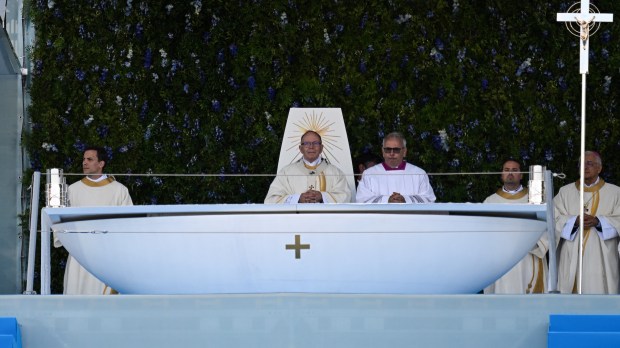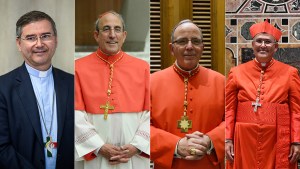Pope Francis has acceptedthe resignation of the Patriarch of Lisbon, Cardinal Manuel Clemente, who reached the age of 75 on July 16, the Vatican press office reported on August 10, 2023. His decade at the head of the Portuguese capital’s diocese ended with the celebration of World Youth Day from August 1 to 6. He is being replaced by Bishop Rui Manuel Sousà Valerio, a 58-year-old Montfort religious, who had been Portugal’s Bishop of the Armies since November 2018.
Cardinal Clemente’s retirement at the end of the WYD had been rumored for several weeks. Born in 1948 on the outskirts of Lisbon and ordained a priest in 1979, Cardinal Clemente was mainly responsible for seminary training before being appointed Auxiliary Bishop of Lisbon by John Paul II in 1999. Cardinal Policarpo entrusted him with the task of organizing the International Congress for the New Evangelization, held in Lisbon in 2005, following the one in Paris in 2004.
In 2007, Benedict XVI entrusted him with the Diocese of Porto, the country’s second largest city. As a sign of his renown, in 2009 he was awarded the Prix Pessoa, his country’s highest cultural accolade. He is still the only religious recipient of this civil award.
Shortly after the 2013 conclave, he was chosen by Pope Francis to become Patriarch of Lisbon. After having served as vice-president of the Portuguese Bishops’ Conference for two years, he was elected president (also in 2013), a position he would hold until 2020. In 2015, Pope Francis elevated him to the cardinalate.
His tenure at the head of the episcopate would be marked by the turmoil of the sexual abuse revelations. In early 2023, an independent commission requested by the Church issued its report on the abuse of children by priests since 1950. It concluded that at least 4,815 minors had been sexually abused over the years. A year earlier, Cardinal Clemente had said he was ready to “acknowledge the errors of the past” and “ask forgiveness” from the victims.
Taking stock of his 10 years at the head of the Diocese of Lisbon, he admitted at the end of the Easter 2023 celebrations that this period of truth-telling about abuse was the most difficult of his patriarchate, and assured those who have suffered of his support.
His decade as Patriarch of Lisbon ended on a more positive note with the success of World Youth Day, which saw more than 1.5 million young people converge on the Portuguese capital from August 1 to 6, 2023.
At the WYD closing mass, Cardinal Clemente explained that, despite the organizational difficulties and the one-year postponement of the gathering due to the pandemic, this event will be “remembered in the future as a decisive moment for a generation that will build a more beautiful and fraternal world.”
Unexpected promotion for the Bishop of the Armed Forces
Contrary to some speculation about a promotion for Cardinal-designate Américo Aguiar, Auxiliary Bishop of Lisbon and President of the WYD Organizing Committee, the Pope’s choice for Lisbon fell on a more discreet prelate, Bishop Rui Manuel Sousà Valerio, a 58-year-old Montfort religious, who has been Bishop of the Armed Forces of Portugal since November 2018.
Born on December 24, 1964 in Ouré, in the Diocese of Leiria-Fatima, Rui Manuel Sousà Valerio took his religious vows in the Company of Mary in 1990. Members of this congregation, founded in 1713 in Saint-Laurent-sur-Sèvre, Vendée (France), are commonly known as “Montfortians,” as they are inspired by the spirituality of St. Louis Marie Grignion de Montfort.
Ordained a priest in 1991, Rui Manuel Sousà Valerio studied at the Pontifical Lateran and Gregorian Universities, as well as at La Sapienza. He also studied spirituality at the International Montfortian Center in Leuven, Belgium.
He exercised several parish ministries in Italy and Portugal, later becoming a military chaplain at the Naval Hospital in Lisbon and the Naval School in Alfaiete. In October 2018, Pope Francis appointed him bishop of the Armed Forces, and he was installed on November 25.
Bishops in their 50s
A sign of generational renewal, his name joins the list of bishops in their 50s who have recently been promoted in several European capitals, such as soon-to-be archbishop Luc Terlinden in Malines-Bruxelles (Belgium) or cardinal-designate Archbishop José Cobo Cano in Madrid (Spain), whose cardinalate was announced the day after his installation mass.
The bishop of the Portuguese capital, who is traditionally promoted to the cardinalate shortly after taking office, has symbolically held the title of ‘patriarch’ since 1716, as part of the restructuring of Portugal’s dioceses introduced under the pontificate of Clement XI. Like that of Venice, however, this title does not imply a higher degree of jurisdiction than that of a simple archbishop.
According to the Pontifical Yearbook, the Patriarchate of Lisbon, structured into 285 parishes, counts around 1,5 million Catholics, or almost 90% of the Portuguese capital’s total population. These Catholics are served by around 540 priests, a number that has moderately decreased since 2000, when Lisbon had around 600 priests.



